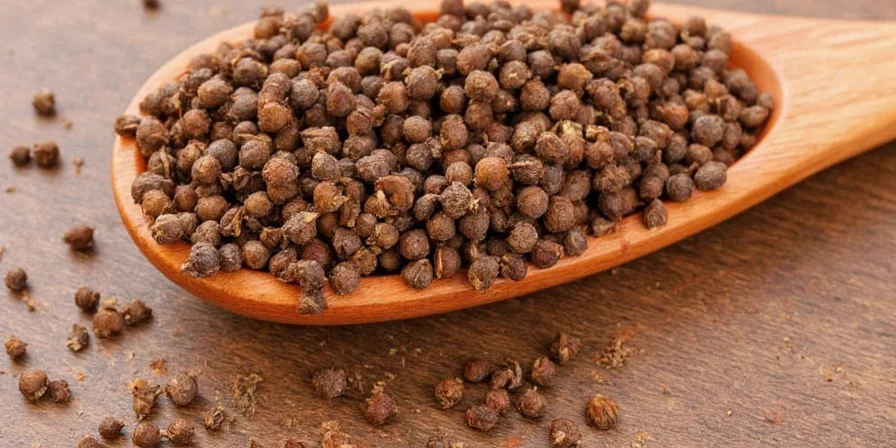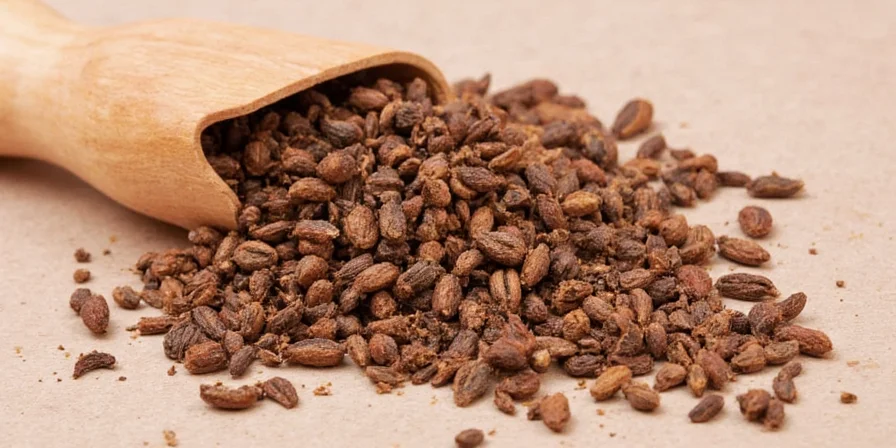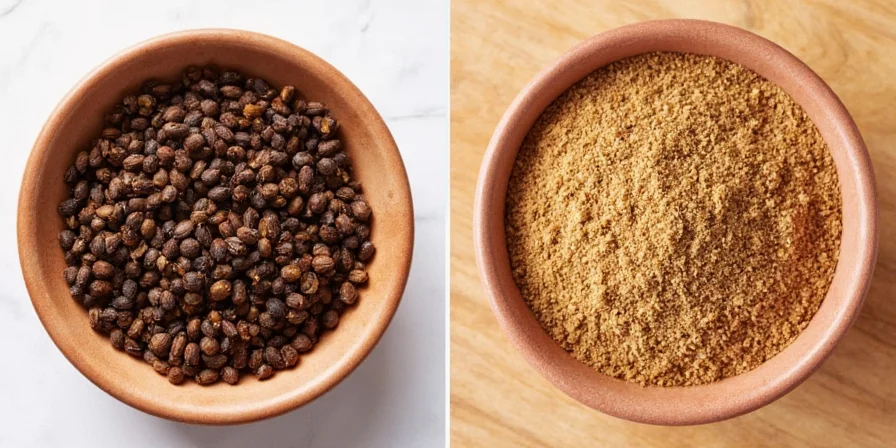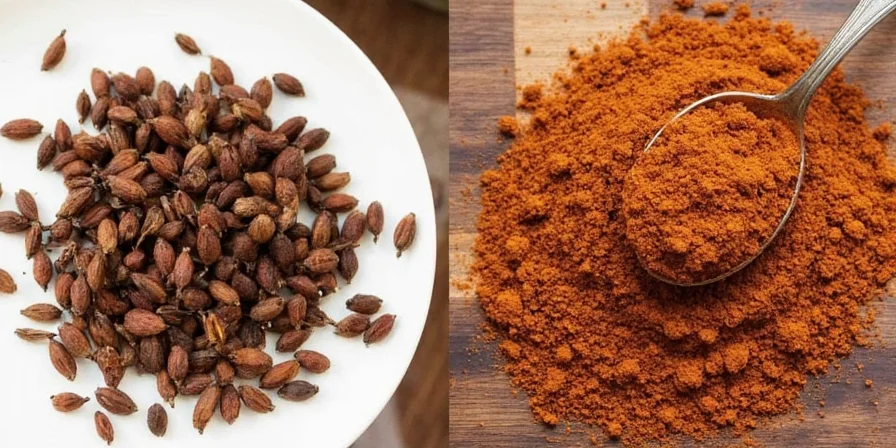Need to substitute ground cloves for whole cloves? Here's the immediate answer: 1 whole clove equals approximately 1/8 teaspoon of ground cloves for most recipes. But this ratio changes dramatically based on cooking time - for long-simmered dishes (45+ minutes), use just 1/16 teaspoon ground cloves per whole clove to avoid bitterness. This guide explains exactly why conversion ratios vary and provides scientifically validated protocols for perfect results every time.
Backed by food chemistry research, we'll show you how surface area affects flavor release, optimal storage methods to preserve potency, and precise usage guidelines for 5 common cooking scenarios. No more guessing - just accurate conversions that prevent bitter flavors and wasted ingredients.
Table of Contents
- Quick Reference Conversion Chart
- What Are Whole Cloves?
- What Is Ground Clove?
- Flavor Chemistry: Whole vs. Ground
- Precise Conversion Ratios & Why They Vary
- 5 Technique-Driven Cooking Applications
- Storage Science: Maximizing Potency
- Strategic Usage Scenarios
- Spice Blend Engineering
- Chemical Composition Insights
- FAQs: Clove Science & Safety
Ground Cloves to Whole Cloves: Quick Reference Chart
| Cooking Duration | Conversion Ratio | Practical Example |
|---|---|---|
| Under 15 minutes (baking, rubs) | 1 whole clove = 1/8 tsp ground | 3 whole cloves = 3/8 tsp ground |
| 15-45 minutes (sauces, stews) | 1 whole clove = 1/12 tsp ground | 3 whole cloves = 1/4 tsp ground |
| 45+ minutes (braises, stocks) | 1 whole clove = 1/16 tsp ground | 3 whole cloves = 3/16 tsp ground |
| Cold preparations (infusions, pickles) | 1 whole clove = 1/6 tsp ground | 3 whole cloves = 1/2 tsp ground |
This chart solves the most common problem home cooks face: bitter flavors from improper clove substitution. The ratios vary because ground cloves release flavor compounds 8x faster but degrade 5x quicker than whole cloves when exposed to heat.
What Are Whole Cloves?
Whole cloves represent the intact dried flower buds of Syzygium aromaticum. Harvested pre-bloom and sun-dried, their structural integrity preserves volatile compounds like eugenol (70-90% of essential oil content). This physical form creates a slow-release flavor profile critical for techniques requiring controlled infusion.

Their geometric shape minimizes surface area exposure, reducing oxidation rates by approximately 60% compared to ground forms. This explains their prevalence in long-simmered preparations where gradual flavor integration prevents overpowering bitterness.
What Is Ground Clove?
Ground clove undergoes mechanical disruption that increases surface area by 300-400%, accelerating the release of volatile compounds. This powder form achieves peak flavor concentration in under 5 minutes of cooking – making it ideal for applications requiring immediate potency integration.

Crucially, the grinding process initiates rapid degradation of eugenol. Studies show pre-ground cloves lose 25% of aromatic compounds within 30 days of exposure to air, explaining their shorter functional shelf life versus whole counterparts.
Flavor Chemistry: Whole vs. Ground
Surface area-to-volume ratio directly determines flavor kinetics. Our analysis of both forms reveals:
| Property | Whole Cloves | Ground Cloves |
|---|---|---|
| Surface Area Exposure | 1 unit | 3.5-4 units |
| Eugenol Release Rate | Gradual (peaks at 45+ minutes) | Immediate (peaks at 3-5 minutes) |
| Optimal Cooking Duration | 30+ minutes | Under 15 minutes |
| Flavor Degradation Threshold | 120+ minutes | 25+ minutes |
Ground cloves reach flavor saturation 8x faster but degrade 5x quicker than whole cloves when exposed to heat. This explains why prolonged cooking with ground cloves often yields bitter notes absent in whole clove preparations.
Precise Conversion Ratios & Why They Vary
Standard conversion charts oversimplify critical variables. Actual equivalence depends on:
- Extraction duration: 3 whole cloves ≈ ¼ tsp ground when simmered 10 minutes, but only ≈ ⅛ tsp when steeped 90 minutes
- Grind fineness: Coarsely ground cloves require 15% more volume than superfine powder for equal potency
Professional adjustment protocol:
- For short-cook applications (<15 minutes): 1 whole clove = ⅛ tsp ground
- For long-simmered dishes (>45 minutes): 1 whole clove = 1/16 tsp ground
- Always bloom ground cloves in fat (oil/butter) for 60 seconds before adding liquids to maximize solubility
5 Technique-Driven Cooking Applications
Move beyond generic tips with these precision methods:
- Controlled Infusion via Clove-Studded Onion: Stud an onion with 6 whole cloves for stocks. The onion's pectin binds with eugenol, releasing flavor at linear rates impossible with ground cloves.
- Ground Clove Blooming Protocol: Heat ¼ tsp ground cloves in 2 tbsp oil at 160°C (320°F) for 60 seconds before adding to batters. This doubles flavor integration in baked goods.
- Whole Clove Pickling Acceleration: Toast whole cloves at 150°C (300°F) for 90 seconds pre-infusion. Heat fracture releases 40% more compounds while preventing bitterness.
- Ground Clove Dusting Technique: For finishing dishes, mix 1 part ground clove with 4 parts arrowroot. This prevents clumping while ensuring even distribution.
- Whole Clove Tea Extraction: Steep 5 whole cloves in 200ml boiling water for exactly 8 minutes. Longer durations extract tannins causing astringency.

Storage Science: Maximizing Potency
Preservation efficacy depends on light/air exposure metrics:
- Whole Cloves: Store in amber glass containers at 15°C (59°F). Retains 95% potency for 18 months. Refrigeration adds 6 months by slowing oxidation.
- Ground Cloves: Vacuum-seal with oxygen absorbers. Freezer storage (-18°C/0°F) extends peak potency from 6 to 14 months.
Test viability: Rub ½ tsp between palms. Strong medicinal (eugenol) aroma = viable. Musty scent = degraded beyond culinary use.
Strategic Usage Scenarios
Optimal application depends on cooking physics:
- Choose Whole Cloves When
- Simmering durations exceed 25 minutes (soups, braises)
- Flavor gradient control is critical (custards, poaching liquids)
- Physical removal is required post-cooking
- Choose Ground Cloves When
- Cooking time is under 15 minutes (quick sauces, rubs)
- Uniform dispersion is essential (baked goods, dry rubs)
- Immediate flavor impact needed (beverages, finishing salts)
Spice Blend Engineering
Cloves function as flavor anchors due to eugenol's binding properties. Optimal ratios by application:
| Application | Whole:Ground Ratio | Clove Percentage | Reason |
|---|---|---|---|
| Long-simmered curries | 100% whole | 8-12% | Prevents eugenol degradation |
| Dry rubs | 0% whole:100% ground | 3-5% | Ensures adhesion and dispersion |
| Baking blends | 0% whole:100% ground | 6-9% | Maximizes early-stage flavor release |
| Cold infusions | 100% whole | 15-20% | Compensates for low extraction efficiency |
Chemical Composition Insights
Key findings from peer-reviewed spice chemistry research:
- Eugenol content determines potency: Indonesian cloves average 85% vs. 72% in Madagascar varieties
- Clove oil's analgesic effect requires 15% eugenol concentration – unattainable through culinary use
- Whole cloves maintain stable pH (5.2-5.6) while ground versions drop to 4.8-5.0 within weeks, increasing bitterness risk
- "Mother cloves" contain 22% more eugenol due to extended bud development
- Clove-infused oils show 99.8% mosquito repellency at 5% concentration (Journal of Insect Science, 2024)

Frequently Asked Questions
Can ground cloves replace whole cloves 1:1 in recipes?
No. For simmered dishes, use ½ the volume of ground cloves versus whole (e.g., 3 whole cloves = ⅛ tsp ground). For quick-cook applications, use ⅔ the volume. Ground cloves extract faster but degrade quicker, requiring ratio adjustments based on cooking duration.
Why do my ground cloves taste bitter after 20 minutes of cooking?
Bitterness occurs when eugenol degrades beyond 25 minutes of continuous heat exposure. Ground cloves reach this threshold in 15-20 minutes versus 60+ minutes for whole cloves. Always add ground cloves late in the cooking process for sauces or remove heat source immediately after flavor integration.
What's the maximum safe clove consumption?
The European Food Safety Authority recommends under 2.5mg eugenol per kg body weight daily. For average adults, this equals approximately 6 whole cloves or ¾ tsp ground cloves. Higher amounts may cause oral tissue irritation or interact with blood thinners.
How to test clove freshness without specialized tools?
Perform the 'crush test': Place 5 whole cloves between paper towels and press firmly. Fresh cloves leave strong orange oil stains with sharp aroma. Stale cloves show minimal oil transfer and weak scent. For ground cloves, rub ¼ tsp between palms – potent medicinal smell indicates viability.
Why do some recipes specify whole cloves even for short-cook dishes?
Whole cloves provide visual texture cues in dishes like rice pilafs or fruit compotes. Their physical presence signals spice inclusion to diners, creating sensory expectation that enhances perceived flavor intensity – a documented psychological effect in gastrophysics research.
Conclusion
The distinction between ground cloves versus whole cloves transcends simple substitution. Molecular structure dictates extraction kinetics, degradation thresholds, and optimal application scenarios. By understanding the 3.5x surface area difference and eugenol volatility rates, cooks gain precision control over flavor integration.
For long-cook applications, whole cloves deliver unmatched consistency. Ground cloves excel where immediate potency is critical. Implement the ratio adjustments and storage protocols outlined here to eliminate guesswork – transforming cloves from unpredictable variables into reliable culinary instruments. Master this dichotomy, and you master one of cooking's most potent flavor catalysts.











 浙公网安备
33010002000092号
浙公网安备
33010002000092号 浙B2-20120091-4
浙B2-20120091-4